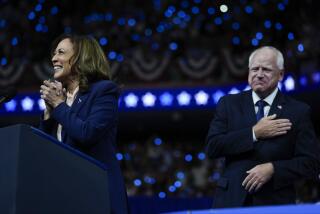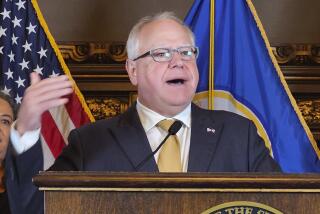Dukakis, Bush Win Vermont; Jackson Second
- Share via
MONTPELIER, Vt\o7 .\f7 — Gov. Michael S. Dukakis of neighboring Massachusetts and Vice President George Bush won Vermont’s non-binding presidential primaries Tuesday, contests with more psychological than electoral significance on the pathway to Super Tuesday.
Among the Democrats, the Rev. Jesse Jackson ran a surprisingly strong second, with more than a quarter of the Democratic vote in a state where blacks are less than 1% of the population.
With 98% of the precincts reporting, Bush had 22,408 votes in the Republican primary, or 49% of the total, to Dole’s 17,753, or 39%. Trailing far behind were former religious broadcaster Pat Robertson with 5% and Rep. Jack Kemp of New York with 4%. Former Delaware Gov. Pierre S. (Pete) du Pont IV and former Secretary of State Alexander M. Haig Jr., who have withdrawn from the race, had 2% and 1%, respectively.
Among the Democrats, Dukakis had 27,043, or 56%, and Jackson had 12,724, or 26%. Missouri Rep. Richard A. Gephardt, who visited the state several times, had 8% and Illinois Sen. Paul Simon, who made no real effort here, had 6%. Former Colorado Sen. Gary Hart had 4% and Tennessee Sen. Albert Gore Jr. was not on the ballot.
Jackson’s showing strengthened his contention, already evident in other contests, that his appeal was broader than his traditional base. He was exceeding by more than three times his showing in the 1984 Vermont primary, when he received almost 8% of the vote.
“We have found the common chord that is linking the American people, whether they are in Iowa or Maine or New Hampshire or Mississippi,” Jackson said.
His showing to a large extent overshadowed the performance of the winners, who had been heavily favored to repeat their previous victories in the New Hampshire primaries and Maine caucuses.
‘Beyond the Black Vote’
“I am very pleased with the results,” said Vermont Gov. Madeleine M. Kunin, a Dukakis supporter. At the same time, Kunin said Jackson’s vote “clearly shows his growing strength. His vote goes beyond the black vote.”
“This win gives us three out of three in New England, and I’m hopeful we can be as successful this Saturday in South Carolina and on Super Tuesday,” Bush told the Associated Press while campaigning in Florida.
“Vermont Republicans are sending a clear message to George Bush: ‘Good luck on Super Tuesday,’ ” said Jack Lindley, Bush’s Vermont state chairman. Twenty states will hold primaries or caucuses on Super Tuesday next week.
A Dole campaign spokesman said his staff was very pleased with Dole’s “strong showing” and would use the primary results to build up for the GOP caucuses in April.
An NBC exit poll of 1,400 Democratic voters showed that Jackson fashioned his strong second-place showing by gaining two-thirds of the vote from those who described themselves as “very liberal.”
Effect of Economic Views
Jackson did better among voters pessimistic about the economy, but most voters said they were optimistic about economic conditions and they went for Dukakis by more than 2 to 1.
The overwhelming second choice of Jackson’s supporters, meanwhile, was Dukakis.
Among 1,400 Republicans polled, the vote divided sharply along ideological lines. Those describing themselves as liberal went strongly for Dole, whereas Bush won the conservative vote. Voters who regarded President Reagan favorably went strongly for the vice president and Bush did better than Dole among urban voters.
Dole began campaigning in Vermont well before New Hampshire. His wife, Elizabeth, reinforced his message by returning to Vermont last week. He was endorsed by several top Republicans, including Sen. Robert T. Stafford, Rep. James M. Jeffords and former Gov. Richard A. Snelling.
Some of the Kansas senator’s supporters, sensing the possibility of victory, urged him to return to Vermont in the closing days of the campaign but he chose to concentrate on the Super Tuesday contests in the South.
Clear Democratic Favorite
Dukakis was the clear Democratic favorite after his victory in the New Hampshire primary Feb. 16 and the Maine caucuses on Sunday. But the Massachusetts governor took no chances.
He had 15 paid staffers in Vermont. They launched an extensive phone canvass of Democratic and independent voters, purchasing lists used in Vermont’s 1986 elections.
In addition to identifying their supporters by phone, the Dukakis campaign sent 40,000 people on the lists a four-page tabloid containing the governor’s record and presidential themes.
Jackson benefited from an organization of people long active in progressive causes in Vermont. Bernard Sanders, the socialist mayor of Burlington--Vermont’s biggest city--supported Jackson, who visited the state several times.
Supplementing more than 60 volunteers, Jackson spent $5,800 on last-minute television ads, hoping to demonstrate--as he did in Maine--appeal to a broad spectrum of voters. The non-binding presidential primary was held on town meeting day. Across Vermont, residents gathered Tuesday to practice this historic form of democracy, grappling with such issues as local budgets, cemetery commissions, road repaving and financing of senior citizen activities.
The actual selection of Vermont’s delegates does not start until April 19 at local party caucuses.
The results of the beauty contest balloting are not always a harbinger of spring. In 1980, President Jimmy Carter easily defeated Sen. Edward M. Kennedy of Massachusetts by a 3-1 ratio in the non-binding Democratic primary. But later in the year, Kennedy won the caucuses.
Times researcher Eileen V. Quigley contributed to this story.
More to Read
Get the L.A. Times Politics newsletter
Deeply reported insights into legislation, politics and policy from Sacramento, Washington and beyond. In your inbox twice per week.
You may occasionally receive promotional content from the Los Angeles Times.










